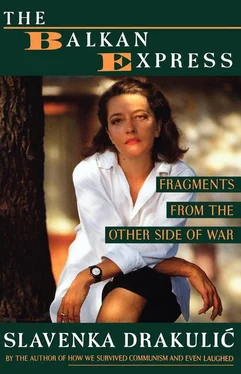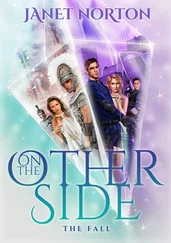There are two photos of you that I like best and, as you can imagine, I put them on the wall (yes, I know, you hate it but you have to understand that I need this): one as a girl of three dressed in jeans, with curly hair and traces of chocolate around her mouth. The other one is of a sophisticated young lady holding a cigarette (much as I disapprove of it!) taken when you were seventeen. Is it that cigarette, or rather, the way you hold it, the way you inhale and puff away the smoke, that broad gesture that reminds me of your father. I wonder what he thinks about what is going on here, sitting in Toronto. Have you heard from him recently? We married when I was eighteen and he was nineteen. I was aware that he was from a Serbian family while I was from a Croatian one, but it didn’t mean anything to me, one way or the other. World War II was long over when the two of us were born and throughout my life it seemed to me that everyone was trying to escape its shadow, to forget and just live their lives. Your father and I never even discussed the different nationality of our families. Not because it was forbidden, but because it was unimportant to the majority of our generation. It wasn’t an issue. Maybe it was a consequence of the repression of the communist regime, of the brainwashing of our education system, the plan to create an artificial ‘Yugoslav’ nation – the fact is that in the 1980 census 1.5 million declared themselves Yugoslav, people of a non-existent nation, and interestingly enough, they were all born after the War and approximately thirty years old. Or maybe it was just the natural course of things, I don’t know. I just know that we were not interested in the past, in who killed whom and why, but in our own lives. The tragedy and the paradox of this situation now is that you will have to decide, to take his or my side, to become Croat or Serb, to take on and suffer his and my ‘guilt’ of marrying the ‘wrong’ nationality. In the war there is no middle position. All of a sudden, you as Croat or Serb become responsible for what all other Croats or Serbs are doing. You are reduced to a single nationality – almost sentenced to it, since nationality in the war brings a danger of getting killed just because of it. I am not talking about who is wrong or who is right in this war, the facts are known by now. I am telling you about the situation when you are forced to choose, to identify with something that has been unknown to you, a total abstraction. But you know it all. ‘I am from Zagreb,’ you said and perhaps it is the only right answer, to be a Citizen. But not now. Not here.
This war happened nel mezzo del cammin di nostra vita so if anything, I should be old enough to try to understand where it comes from and how it started. In fact I could see it coming closer and closer with each passing year, then month, then day. One could detect the gradual return to the past long before 1989 with Milosevic’s invocation of Serbian nationalist feelings and hatred, first towards Albanians from Kosovo, then towards non-Serbians throughout the whole country – remember how far from us it all looked, how ready we were to deny the coming danger? There were other signs – the tallying up of war victims, justification of war criminals, the resuscitating of old national myths, the revival of religion on both the Catholic and Orthodox sides. But one could still attempt to see it as a reinterpretation of history, a necessary purge of post-war myths about the communist revolution if only it hadn’t been aimed at an entirely different purpose: at national homogenization and the growing antagonism between the nations. Long before the real war, we had a media war, Serbian and Croatian journalists attacking the political leaders from the opposite republic as well as each other as if in some kind of dress rehearsal. So I could see a spiral of hatred descending upon us, but until the first bloodshed it seemed to operate on the level of a power struggle that had nothing to do with the common people. When the first houses were burned down on Croatian territory, when neighbours of a different nationality in the mixed villages started to kill each other, then it became our war too, of your generation and mine. Not out of ideology, but for the simple reason that it changed our whole life. Yours more than mine, because men from my generation are almost too old – with their grey hair and pot bellies, they’d look pretty silly in those camouflage uniforms. How many of your friends will survive? But what did you and your generation born in 1968 know of that past, of the hatred that is haunting us now?
After all, it was your grandfathers who fought in World War II. They had fought as Tito’s Partisans, Ustashas or Chetniks. Afterwards, hoping for a brighter future they rebuilt the devastated country according to bolshevik principles, ruled by the Communist Party as the vanguard of the people. All of them lived long enough to see the party become corrupt and repressive, but only some of them lived to see the communist regime begin to fall apart in 1989. Yet, none of them believed that history could repeat itself. It was my generation that grew up in times of scarcity when milk and butter, meat and clothes were rationed (you know what my spine looks like because I still suffer from the consequences of rickets). Sometimes we tasted powdered milk from UNRRA packages – it was so sweet that we licked it from our palms like some special kind of sweet. Or we’d eat yellow Cheddar cheese from the cans, or margarine, or ‘Truman’s eggs’ as we called powdered eggs. People moved to the cities to help build up heavy industry; we all went to schools, education was a big thing then. Married, we tried different combinations to escape living in crowded communal apartments shared by two or three families. We enrolled in the Communist Party as our fathers did, but only because it was so much easier to get jobs and promotion if you did.
In the meantime your generation of the late sixties and early seventies grew up fast. You would listen to your grandaddy’s war stories after family lunch on Sundays with an obvious air of boredom. You couldn’t care less about it; everything before you were born belonged to the same category of ancient history – World War II, World War I, the Napoleonic Wars, the wars between Athens and Sparta. Sometimes you watched the old movies with Partisans and Germans and Chetniks and Ustashas, but with ironic detachment and the sophistication of someone who knows everything there is to know about Spielberg, Jarmush and so on. You watched us buying better cars to replace the Fiat 750, a colour television, a weekend house on the Adriatic coast. We went together to Trieste or Graz to buy Nike sneakers, Levi’s, Benetton pullovers and walkmans for you. And computers – for you too, because we were technologically illiterate. You learned languages – English, of course, was the most important – and started to travel abroad on your own and your values became more and more removed from ours: career, money, but no politics, please. Now you are back in those old movies: you have to declare your nationality despite being barely aware of the past. Maybe at the beginning it looked like a Rambo movie: Ray Bans, Uzis, bandanas tied around your heads. But too many of you have died by now for the rest to believe it is just a game. You no longer watch Apocalypse Now , you live it. At least you are defending your own country and I cannot but keep wondering, as I’m sure you do too, what do boys on the other side believe they are doing? For me, every death is senseless because the war itself is senseless – but if there are degrees of senselessness, their death must be the more senseless.
You were already gone when I came across an article in a local newspaper. Entitled ‘Will You Come to my Funeral?’ it was about the younger generation and how they feel about the war. I remember an answer by Pero M., a student from Zagreb.
Читать дальше












